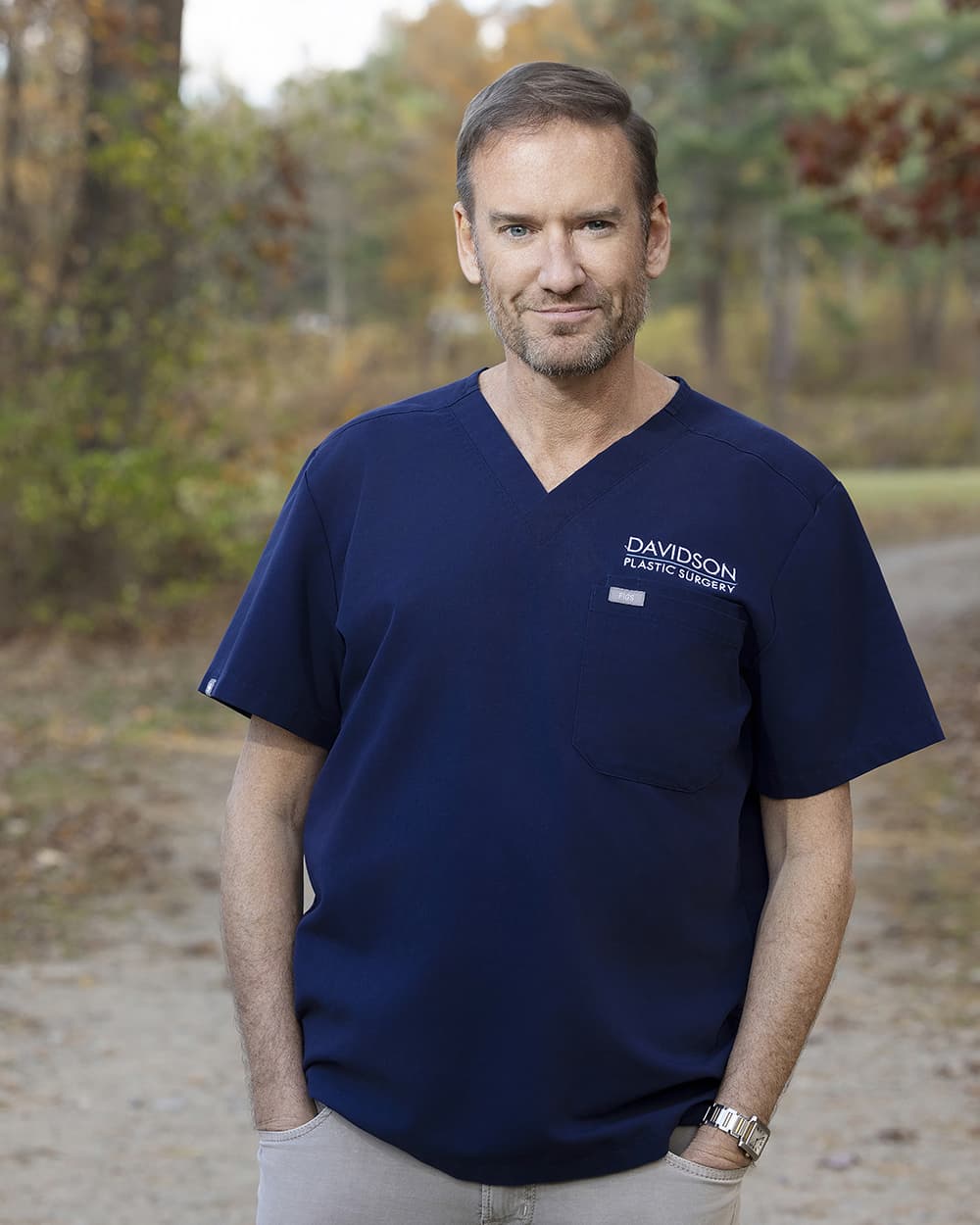Christopher J. Davidson, MD
Fraser Medical Building
332 Washington Street, Suite 100
Wellesley, MA 02481
Phone: (781) 237-7700
Monday–Friday: 9 a.m.–5 p.m.
Do you feel self-conscious about your chest because your breasts are larger or your chest tissue sags more than most men’s? Perhaps you have managed, through a combination of hard work and sheer determination, to lose a large amount of weight but now find that excess or sagging tissue in your chest area keeps you from feeling as trim as your effort deserves. You are not alone. Abnormal glandular breast overgrowth is not as rare as you may think. It afflicts as many as 65 percent of adolescent males and 10 to 15 percent of adult males.
For some men, it is a completely normal condition. For others, it is simply a result of extensive weight loss. Regardless of the cause, it can seriously diminish your self-esteem. Dr. Christopher Davidson offers an effective solution with gynecomastia surgery (also called male breast reduction) for his patients from Wellesley, Natick, Framingham, and throughout the western suburbs of Boston, Massachusetts; Providence, RI; southern New Hampshire; and southern Vermont.
Male breast reduction is a procedure that will give you a flatter, firmer, more masculine chest. The American Society of Plastic Surgery ranks gynecomastia surgery, or male breast reduction, as one of the top five cosmetic surgeries performed on men.
Discover what gynecomastia surgery in Boston, MA, can do. Call Dr. Christopher J. Davidson at (781) 237-7700 or request a consultation.
If you are a man with large breasts or sagging, excess tissue on your chest, Dr. Davidson can safely help you achieve a more masculine appearance with a combination of liposuction, direct removal of glandular tissue, and judicious skin removal. Typically the gynecomastia surgery scar is concealed within the transition between the darker nipple skin and the lighter chest skin. Most often, a carefully placed incision at the border of the areola allows Dr. Davidson to remove the necessary tissue while avoiding creating a large scar.
The gynecomastia surgery procedure is done on an outpatient basis and takes approximately two hours to perform, either under general anesthesia or with sedation and local anesthesia.
After gynecomastia surgery, you will return home with an initial dressing to be kept in place for approximately five days. This dressing reduces the swelling and fluid accumulation and supports your new chest contour as it heals.
Your chest will be uncomfortable for several days or so after gynecomastia surgery, but the pain is generally tolerable. Within a week, the bruising and tenderness usually diminish, and you can return to work and social activities. You should, however, avoid strenuous exercise for four weeks, as well as refrain from any activity that might cause impact or friction on the site of the gynecomastia surgery.


Dr. Christopher Davidson's patient first approach to aesthetic medicine means that every decision he makes is aimed at achieving the optimal outcome for the patient. This is apparent, not just in the beautiful, natural-looking results he creates, but also in the compassionate care he delivers through every step of the process.



Large breasts and pronounced nipples are not typically considered to be masculine features. Even after consistent exercise and weight control, many men suffer from a condition known as gynecomastia, where the patient has woman-like breasts. The word gynecomastia has been derived from two Greek words: gyne, which means woman, and mastos, which means breast. The condition may be very distressing, prompting affected men to consider gynecomastia surgery in Boston.
Adult gynecomastia may be caused by hormonal imbalances, certain types of prescription medicines, or steroid or marijuana use. Gynecomastia seen in puberty most often resolves naturally. It may affect one or both breasts and may cause large, overdeveloped breasts, enlarged nipples, or a combination of both. When it doesn’t resolve spontaneously, gynecomastia surgery may be needed to correct it.
Gynecomastia may appear as a marble-like lump under the nipples, which may then result in swollen areolas. In extreme cases, it may result in C or D cup breasts made of glandular and fatty breast tissue. Symptoms may include associated pain or tenderness, both of which are typically relieved with gynecomastia surgery.
Apart from a complete medical history and physical examination, a gynecomastia surgery patient may have to undergo blood tests for liver function, hormone levels, thyroid function, and urinalysis. The underlying causes may be determined by analysis of tests and examinations by an endocrinologist who specializes in hormonal issues.
In the gynecomastia surgery process, Dr. Davidson sculpts a more masculine chest by directly removing excess breast tissue surgically, with liposuction, or a combination of the two techniques.
The patient should have realistic expectations from male breast reduction surgery and might be a good candidate for gynecomastia surgery if he:
Gynecomastia surgery from Boston’s Dr. Davidson may be performed on an outpatient basis and may require minimal recovery time. The patient may be able to return to work, exercise, and carry out normal activities within several days of surgery. Men can expect there to be some swelling at first, but this subsides and improves in a matter of weeks, if not days. Even with some swelling, the reduction in breast volume should be immediately noticeable—and will become increasingly apparent as time goes by.
The results of gynecomastia surgery are permanent. Like any surgical procedure, a male breast reduction may also require incisions that leave scars. Although these scars are permanent, they are placed inconspicuously and typically fade over time. Avoiding exposure to ultraviolet radiation, such as sunlight, can help any marks to stay as unobtrusive as possible. Reduced volume in the chest also relieves some pressure pushing outward on the nipple, giving the tissue a better environment for healing after gynecomastia surgery.
Of course, changes to the body can impact the look of any area. The new contours enjoyed after gynecomastia surgery are best maintained by keeping a stable, healthy weight. Men who want to avoid developing breasts should also refrain from taking any drugs that might lead new breast tissue to develop.
As noted above, excess fat on the chest can create a look men want to change, but if fat is the problem, liposuction alone —as opposed to gynecomastia surgery—may be the best option. It is important to schedule a consultation with Dr. Davidson so he can work to help determine the underlying cause behind a male chest with feminine characteristics. Patients who are overweight may be dealing with unwanted contours not just on the chest, but the belly, back, and elsewhere. Surgical fat reduction is available for virtually every area of the body. Note that lipo is not considered to be a weight-loss strategy.
Similarly, patients who have lost a considerable amount of weight may find that newly loose, sagging skin hides the silhouette they desire. An upper body lift can eliminate drooping tissue, providing a sleeker, slimmer profile.
In some cases, male breasts may develop due to a combination of both glandular and fatty tissue. Dr. Davidson works with each patient as an individual, creating a plan to provide effective results tailored to the person. Patients who want to discuss further procedures beyond gynecomastia surgery are encouraged to do so.
A. Dr. Davidson recommends doing your research before scheduling a consultation with a plastic surgeon for any procedure, including gynecomastia surgery. Check out his credentials, CV, education, patient reviews, and before and after photos to help you make the right choice for your needs.
A. The type of surgery required for each patient depends on their needs. If you have lost a significant amount of weight and have excess skin and far on your chest, Dr. Davidson will recommend a skin removal procedure along with liposuction if needed. A consultation with your plastic surgeon will enable him to make the best recommendation based on your needs.
A. If you have enlarged male breasts due to hormonal imbalances, gynecomastia can only be treated surgically. If your breasts are strictly due to excess fat on the breasts, in some cases exercise can help reduce the appearance of your breasts.
Discover what gynecomastia surgery in Boston, MA, can do. Call Dr. Christopher J. Davidson at (781) 237-7700 or request a consultation.